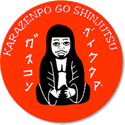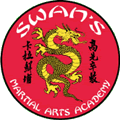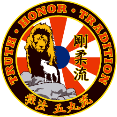Dojo Etiquette:What's with all that bowing?
by Sensei Adam Sheldon
 Dojo etiquette is an often misunderstood but essential part of the martial
arts experience. Many beginners fail to see the immense role that etiquette
plays in transforming a person who studies martial arts into a martial artist.
Those who embrace the rules of etiquette and dojo protocol are most often the
students who last the longest and achieve the most.
Dojo etiquette is an often misunderstood but essential part of the martial
arts experience. Many beginners fail to see the immense role that etiquette
plays in transforming a person who studies martial arts into a martial artist.
Those who embrace the rules of etiquette and dojo protocol are most often the
students who last the longest and achieve the most.
Nearly everyone who studies the martial arts had the same image of Karate prior to entering a dojo for the first time. One who studied the arts was thought to be both wise and powerful, possessing an aura of tranquility and confidence. The desire to emulate these characteristics is at or near the root cause of most peoples decision to begin taking karate lessons. This level of inner peace and respect can only be reached by learning how to respect all others, and realizing the humbling truth of how unimportant we are as individuals in the bigger picture. As Master Duncan often says “You may or may not need Karate, but rest assured, Karate does NOT need you”. This is the very reason that dojo etiquette is so essential.
The expectations of martial arts students varies slightly at every dojo. There are however, many universally accepted customs as well. Students at Duncan’s Martial Arts Academy are expected to show a high level of respect for their instructors and fellow classmates at all times. Students are also expected to show respect by removing their shoes before entering the dojo, bowing before stepping on and off of the training surface, and thanking the instructors for any constructive critiques they may offer. Demonstrating the five general school rules (Effort, Etiquette, Character, Sincerity, and Self Control) is also considered proper behavior. A complete list of School rules and etiquette is available to all students.
As a child views their parents, so should a martial artist views their instructor(s). Many martial arts systems refer to their instructors with family names. SiGung, Sifu, and Sibak are Chinese terms meaning Grandfather, Father, and Uncle. This is a difficult concept for many adults to grasp. The analogy makes more sense however when one thinks of the almost complete lack of martial arts knowledge the beginning student possesses. In order to learn most effectively, the novice must embrace the idea that they know very little. The student who gets caught up in trying to fight the system will, one way or another, become a former student. Conversely, students who humble themselves by learning to yield to and respect the system will likely prosper. As a Chinese proverb says “To be great is to be humble, to be humble is to be great”.






